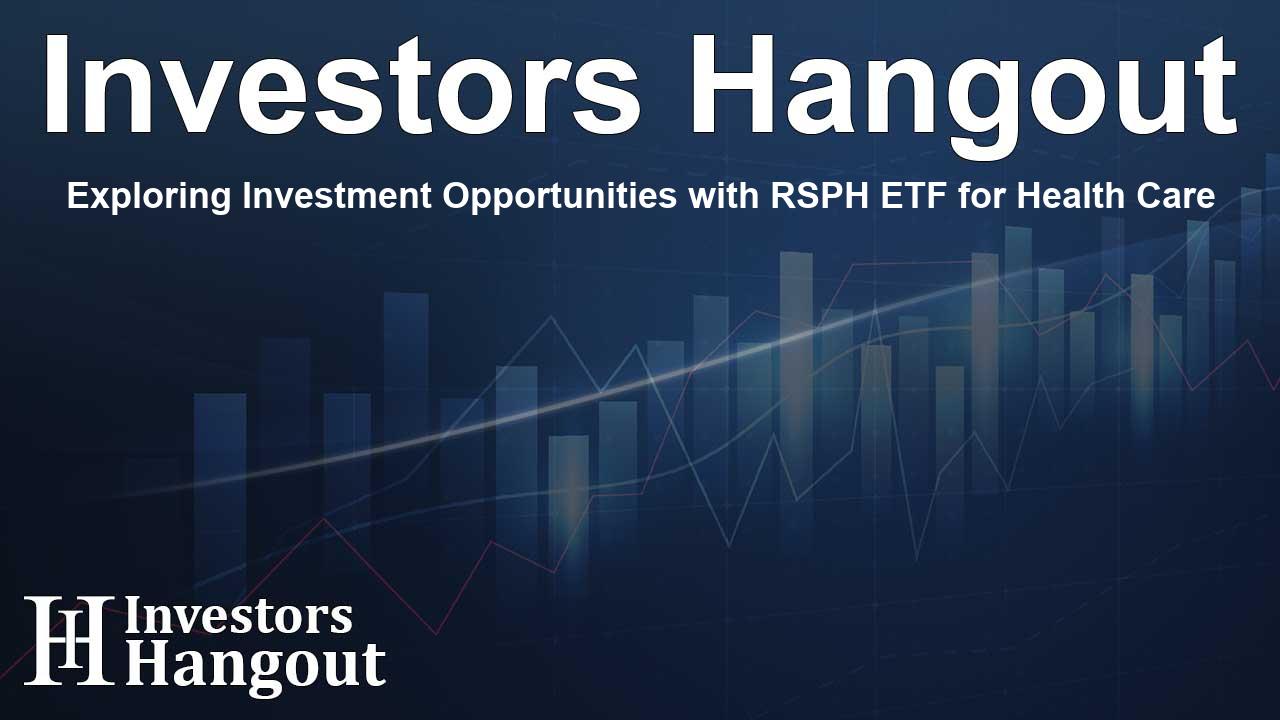Exploring Investment Opportunities with RSPH ETF for Health Care

Investing in Health Care: A Look at RSPH ETF
When considering options for diversifying your investment portfolio, the Invesco S&P 500 Equal Weight Health Care ETF, referred to as RSPH, offers a compelling choice. This ETF, launched in 2006, aims to provide investors broad exposure to the healthcare sector. Among its key features are its passive management strategy, which has garnered interest from both institutional and retail investors.
Investors are increasingly leaning toward ETFs due to their affordability, transparency, and operational flexibility. RSPH not only fits these criteria but also serves as a means to attain long-term growth through diversified investments. Given that healthcare is one of the most essential and rapidly evolving sectors within the equity market, RSPH provides a way to participate in this growth.
Understanding the Index
RSPH is sponsored by Invesco and stands out in the market with over $953 million in assets. The ETF's goal is to track the S&P 500 Equal Weight Health Care Index, which gives equal weight to all stocks within the healthcare segment of the S&P 500 Index. This approach helps reduce concentration risk and provides a balanced exposure across various companies in the healthcare industry.
Cost Efficiency of RSPH
Cost is a crucial factor when assessing ETFs, and RSPH is quite competitive with an expense ratio of just 0.40%. Such an expense ratio indicates lower annual operational costs that can positively affect returns over the long term. Additionally, the ETF currently displays a 12-month trailing dividend yield of 0.61%, making it an appealing option for income-focused investors.
Diving into Sector Exposure and Major Holdings
One of the ETF's primary advantages is its substantial allocation within the healthcare sector, accounting for nearly 100% of its assets. It is crucial to analyze the underlying assets in any ETF to understand the potential risks and returns. The top individual holdings in RSPH include notable companies such as Bio-Rad Laboratories Inc, which makes up about 1.82% of the ETF, followed by Bristol-Myers Squibb Co and Gilead Sciences Inc. Collectively, the top ten holdings constitute about 17.87% of total assets, enhancing the overall diversification of the ETF.
Evaluating Performance and Risks
Performance metrics are essential in evaluating any investment, and RSPH has made a noteworthy entrance this year, gaining approximately 7.38%. Over the past year, the ETF has seen an impressive rise of about 12.94%. Its trading range over the previous 52 weeks has been between $25.30 and $32.39, indicating its resilience in the market.
With a beta of 0.84, RSPH suggests lower volatility compared to the broader market, appealing to more risk-averse investors. The standard deviation for the trailing three-year period is at 16.29%, which reflects the moderateness in price fluctuation. Moreover, with approximately 65 holdings, RSPH effectively mitigates company-specific risks.
Exploring Alternatives in Health Care ETFs
RSPH carries a Zacks ETF Rank of 3, categorized as a 'Hold', reflecting a balanced expectation regarding future returns. For those looking for additional options in the healthcare space, other ETFs like the Vanguard Health Care ETF (VHT) and the Health Care Select Sector SPDR ETF (XLV) present worthwhile alternatives. The VHT ETF tracks the MSCI US Investable Market Health Care 25/50 Index, while XLV follows the Health Care Select Sector Index. VHT boasts assets totaling $18.69 billion and an expense ratio at a competitive 0.10%. Meanwhile, XLV manages an impressive $41.93 billion in assets with a remarkably low expense ratio of 0.09%.
Frequently Asked Questions
What is the Invesco S&P 500 Equal Weight Health Care ETF?
The Invesco S&P 500 Equal Weight Health Care ETF (RSPH) provides investors equal exposure to the healthcare sector stocks within the S&P 500 index.
How does the expense ratio affect investment returns?
A lower expense ratio means that investors keep more of their returns, helping long-term wealth growth, which is critical in ETF investing.
What are the main holdings in RSPH?
The top holdings in RSPH include companies like Bio-Rad Laboratories, Bristol-Myers Squibb, and Gilead Sciences, each contributing to sector diversification.
How has RSPH performed recently?
Recently, RSPH has gained approximately 7.38% this year and around 12.94% over the past year, showcasing a positive trend in performance.
What are some alternatives to RSPH?
Investors seeking alternatives can consider the Vanguard Health Care ETF (VHT) and the Health Care Select Sector SPDR ETF (XLV) as viable options in the healthcare sector.
About Investors Hangout
Investors Hangout is a leading online stock forum for financial discussion and learning, offering a wide range of free tools and resources. It draws in traders of all levels, who exchange market knowledge, investigate trading tactics, and keep an eye on industry developments in real time. Featuring financial articles, stock message boards, quotes, charts, company profiles, and live news updates. Through cooperative learning and a wealth of informational resources, it helps users from novices creating their first portfolios to experts honing their techniques. Join Investors Hangout today: https://investorshangout.com/
Disclaimer: The content of this article is solely for general informational purposes only; it does not represent legal, financial, or investment advice. Investors Hangout does not offer financial advice; the author is not a licensed financial advisor. Consult a qualified advisor before making any financial or investment decisions based on this article. The author's interpretation of publicly available data shapes the opinions presented here; as a result, they should not be taken as advice to purchase, sell, or hold any securities mentioned or any other investments. The author does not guarantee the accuracy, completeness, or timeliness of any material, providing it "as is." Information and market conditions may change; past performance is not indicative of future outcomes. If any of the material offered here is inaccurate, please contact us for corrections.